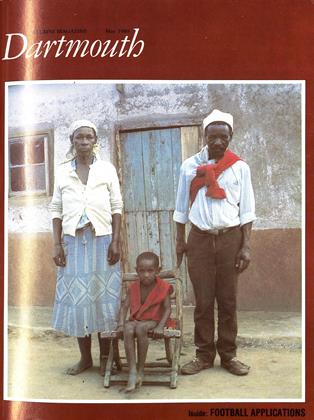Remember English 5 or, depending on how old you are, English 1 and 2? If you do, you probably remember your encounter with Paradise Lost, the traditional centerpiece of the required freshman course in literature and composition. This year, some 200 students about onequarter of the course's total enrollment participated in experimental sections of the course where Milton's masterpiece wasn't taught at all.
Karen Pelz, the course coordinator and co-director of the freshman English program, explained during a recent conversation that the experimental version of English 5 still is a course in literature and composition, but the purpose of the alternative approach is to put more emphasis on developing writing skills and less on literature "in order to achieve a better balance." When literature as demanding as Paradise Lost is taught, she suggested, the writing is likely to be shortchanged.
Although there was no required reading list for all the experimental sections, each section did read Walden a starting point for much of the writing and the student papers themselves often were used as "texts" for discussion in class. The effort was to get the students' writing onto the table. The experiment, which grew out of Pelz's work at an institute for directors of writing programs, will be conducted for at least another year and a departmental committee is attempting to devise a way to evaluate its effectiveness. Pelz described her involvement in the alternative version of English 5 as "the most exciting teaching" she has done at Dartmouth and said other professors teaching the sections also were pleased, but she readily admitted that some people in the English Department are strongly opposed to the change.
One of them, Professor Harold Bond '42, acknowledged that he "hasn't been very supportive of this experiment I've seen so many experiments come and go." He mentioned two conflicting philosophies of teaching writing: The first tends to stress composition as a skill and technique by itself while the second stresses writing papers as a response to great literature. The later approach, the one Bond favors, has been traditional at Dartmouth, he said, in the conviction that it provides the best all-round learning experience.
By anchoring the freshman course to a work such as Milton's, "we are not teaching literary criticism," Bond noted. Although most of the class time is spent talking about the literature, he pointed out, papers responding to the work are extensively commented on and discussed in conferences with students. There are two particularly significant reasons for having English 5 center on a great work of literature, he maintained. It is productive and worthwhile for both professors and students to be considering the same text in common, and there is the humanistic value of studying a work such as Milton's. "Paradise Lost is so important, so great," he added. "It encompasses most of human experience."
 View Full Issue
View Full Issue
More From This Issue
-
 Cover Story
Cover StoryIn Two Worlds
May 1980 By Dan Nelson -
 Feature
FeatureIn Another Country
May 1980 By Beth Ann Baron -
 Article
ArticleAlchemist in Miniature
May 1980 By Michael Colacchio '80 -
 Article
ArticleScientific Humanist
May 1980 By M.B.R -
 Class Notes
Class Notes1978
May 1980 By JEFF IMMELT -
 Article
ArticlePainting Medicos Have Both "Life" and "Work"
May 1980 By D.C.G
Article
-
 Article
ArticleMcDUFFEE '21 WINS HIGHEST POETRY HONORS AT OXFORD
August 1924 -
 Article
ArticleFraternity Council
October 1943 -
 Article
ArticleCommanding Officer
November 1943 -
 Article
ArticleLaurens L. Henderson '22 of Phoenix
MARCH 1959 -
 Article
ArticleA New Hurdle
MARCH 1931 By Harry Hillman -
 Article
ArticleMedical School
APRIL 1963 By HARRY W. SAVAGE M'27


